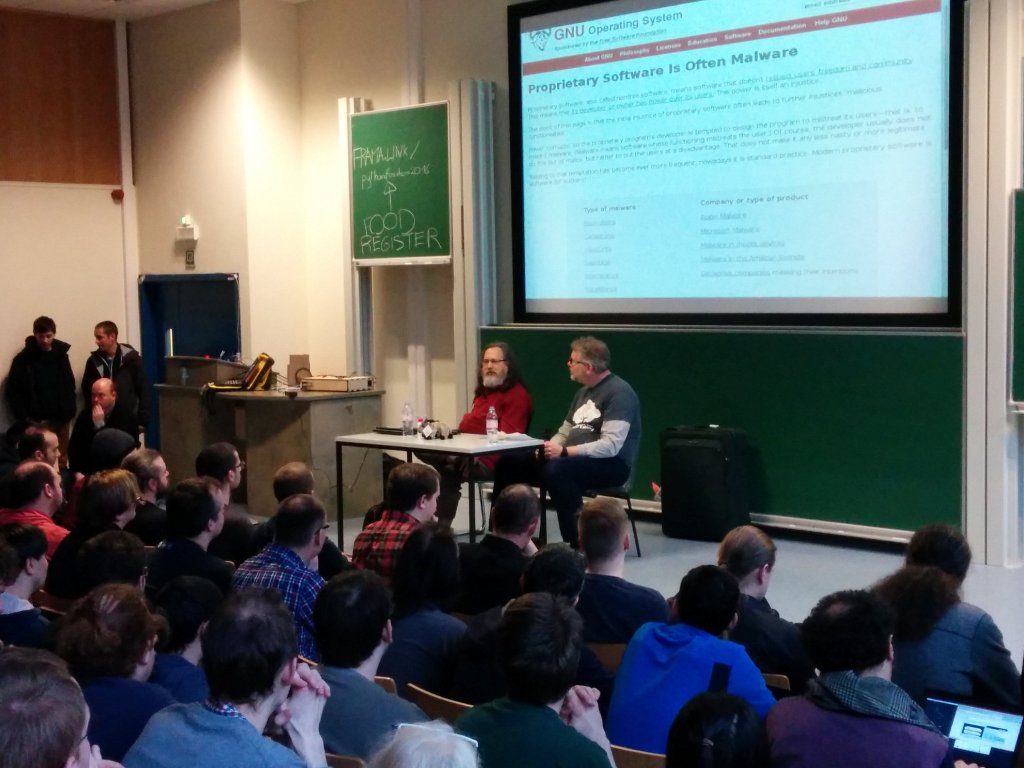02.06.16
Posted in Uncategorized at 12:25 pm by

Summary: What the media really ought to be talking about after the high-profile VirnetX case, rather than obsess about the status of Apple or patent trolls in the Eastern District of Texas
EARLIER this week Apple made headlines because VirnetX had ‘lectured’ Apple on patents. Apple got hit by a troll and it will have to pay a lot of money unless a miracle happens. Apple will not blame software patents (which are inherently the issue almost everywhere) but just “trolls” (the small ones). Joe Mullin, a trolls expert, called VirnetX a “Patent-based company”. When a troll’s value depends just on patents (or a patent) the share price can double because of a court’s ruling. The jury bumped the stock by 88% (the members of this jury may as well have just invested in this troll before the ruling), so there we have an example of non-practicing entities doing little more than just litigation.
A patent lawyers’ site said that a “jury in the Eastern District of Texas has awarded VirnetX $626m after finding Apple had infringed four patents. The PTAB instituted inter partes reviews on the patents last October, however, the results of which could affect the district court case” (that’s from MIP).
Notice the role of the Eastern District of Texas again. It’s not a coincidence. Trolls love the Eastern District of Texas. There’s no lack of coverage of this ruling. Within a few hours we saw more than 100 headlines (too much for exhaustive listing here), some of them included [1, 2, 3, 4, 5, 6, 7, 8, 9, 10, 11, 12, 13, 14, 15, 16, 17, 18, 19, 20, 21, 22, 23, 24, 25, 26, 27, 28] for the record. “Apple now owes VirnetX more than what Samsung owes it”; that’s one way to put it.
Samsung is the leading Android (Linux) OEM, so this is very relevant to us. Even EPO-funded sites mentioned this and then took note of a lesser known patent lawsuit against Apple in China. The author wrote: “Court records from the Chinese manufacturing hub of Shenzhen show that BYD has dropped two patent infringement lawsuits that it filed against client Apple back in May 2015. But since the two cases were closed in late December, the legal back-and-forth has continued in a California federal court, as Apple argues that its supplier breached an IP non-assert clause in their contract and should be compelled to participate in arbitration.”
“This clearly serves to discredit the way this patent system works.”According to software patents fans, some of the patents Apple uses against Samsung are now being challenged at PTAB, and Florian Müller, who spent years promoting/bolstering Apple’s side before defecting, has just published the decision’s PDF and said: “Apple has just responded to Samsung’s mid-December petition for writ of certiorari (request for Supreme Court review) regarding two legal questions concerning design patents and, in the same document, to amicus curiae (“friend of the court”) briefs from major industry players, many IP law professors and various public interest advocates, all of whom agree with Samsung that the top U.S. court should take a look at this matter.”
One can find the PDF of the troll’s case here in Patently-O, which also debated other interesting patent-related matters this week.
“In this case,” wrote Patently-O in one of the above, “the district court found that Lotan had assigned his rights to AngioScore and that his later purported assignment to TriReme actually transferred no rights. These two conclusions led to the final dismissal with a holding that TriReme had no standing to bring its claim.”
This clearly serves to discredit the way this patent system works. The latter analysis, also about the district court, involves Google and says:
In Cioffi v. Google, the Federal Circuit sided with the patentee, Cioffi — holding that the district court erred in its construction of the asserted patent claims and thus vacated the holdings non-infringement and invalidity via indefiniteness. (Non-precedential opinion). Now, Google has petitioned the court for an en banc rehearing asking the court to “strictly construe” claim amendments against the patentee.
This again is about software patents. In fact, pretty much all the above is about software patents, which is what we ought to focus on if these severe issues are ever to be resolved. █
Permalink
 Send this to a friend
Send this to a friend
Posted in Uncategorized at 11:49 am by
English/Original
Publicado en Europe, Patents at 12:26 pm por el Dr. Roy Schestowitz

Credit de Imagen Benjamin Henrion at FOSDEM
Sumario: Benjamín Henrion habló el pasado Domingo acerca de las patentes de software europeas -una presentación que habla de la Corte Unitaria de Patentes, por la que la OEP aboga sin cesar y que es lo que significa para las patentes de software.
TECHRIGHTS ha estado escribiendo acerca de la relación entre la UPC y las patentes de software por más de cinco años. ¿Cómo es esto posible? Bueno, antes que sea llamada UPC (o Patente Unitaria) era conocida como toda suerte de cosas y promóvida por otros políticos com Charlie McCreevy y Michel Barnier.
El pasado fin de semana Richard Stallman dijo que las patentes de software regresan con la Corte Unitaria de Patentes (UPC). La FFII ha escrito en la materia anteriormente cuando era más activa. Su presente líder Benjamin Henrion, habló recientemente acerca de ello en el FOSDEM (cerca de donde vive). Estamos esperando que todo material relacionado sea publicado (especialmente en formato no embarrado con patentes de software) andtes de publicar las diapósitivas que estan aquí [PDF].
“Alguna gente se estan enriqueciéndo extremadamente a costa de los demás y la innovación es orthogonal al sistema de patentes, si no obstruido por este.”¨Mis diapósitivas acerca de la Corte Unitaria de Patentes estan aquí,¨ escribió el pasado Lunex (24 horas despues de la charla) y cuando se le preguntó: ¨Puedan esperar mucho, no son muy rápidos aquí estas personas de FOSDEM.¨ Bueno talvez publiquemos el video más adelante separadamente, junto con los videos de la charla OIN (y tal vez otros). Henrion también dijo que habia intentado escribir a FOSDEM acerca del formato de los videos, ya que esto ha devenido en un desastre (no importa los ampliamente difundidos problemas de projección que los observadores del extranjero tuvieron el fin de semana).
Henrion (conocido online como ¨zoobab¨) notó como la cabeza dela USPTO mostró su verdadera identidad. Michelle Lee aparentemente estaba dispuesta a reunirse con promotores de patentes de software y fánfarrones (a quienes llamamos ¨watchtrolls¨). Dice mucho acerca de la integridad, impropiedad (a veces incestuosa) relaciones entre los oficiales de la USPTO, examinadores de ella, y abogados de patentes. Uno de ellos, administrador del sitio Patent Progress (no activo últimamente), es un clásico ejemplo de esto por la ocupación de su esposa.
El mundo de patentes no es completamente la fantasía que quiere que le mundo vea…
Alguna gente se estan enriqueciéndo extremadamente a costa de los demás y la innovación es orthogonal al sistema de patentes, si no obstruido por este. █
Permalink
 Send this to a friend
Send this to a friend
Posted in Uncategorized at 11:39 am by
English/Original
Publicado en GNU/Linux, Patents, Vista 10 at 12:44 pm por el Dr. Roy Schestowitz
Sumario: El agresivo comportamiento de Microsoft y su BAJA CALIDAD DE PRODUCTOS dejan algunos de sus últimos restos de ´hinchas´ descorazonados y molestos.
TECHRIGHTS ha pasado casi una década escribiendo como Microsoft ha estado abusando y EXTORSIONANDO compañías que fomentan Linux. Microsoft usa PATENTES PARA EXTORSIONAR. Temprano hoy mostramos como Microsoft habiendo secuestrado Nokia de Linux (por entriismo), ahora usa Linux para extorsiónar a líderes de Android en el mercado. No sólo esta abusando competidores (demandando ´dinero por protección) pero tambien esta molestando a sus propios customers al forzarlos a usar Vista 10, incluso cuando ellos lo rechazan tercamente por toda clase de razones legítimas. Como mostramos al principio de año (principios de Enero, vean artículos en la wiki), incluso los ayayeros de Microsoft estan comenzando a molestarse grandemente. Ahora ven los verdaderos colores de Microsoft. Es una compañía de matones y maleantes con un largo record en su haber.
“Si esto es lo que los promotores de Microsoft están diciendo, entonces no estarán abogando por Microsoft por mucho tiempo.”De acuerdo a esta nueve queja de un sitio promotor de Microsoft (Win Beta), ¨Microsoft esta jodiéndo a sus más leales clientes y eso es una idea muy mala¨ (este es el títular). También hay arrogancia. Para citar ¨ Los problemas de acuerda a muchos usuarios de Surface, son extensivos y propagados ampliamente, con muchos dueños – de ambos Surface Book y Surface Pro – reportando problemas como screens que parpadean, batería que pronto se agota, y en general no confianza para tareas diarias.
¨En una declaración un vocero de Microsoft dijo que arreglar los problemas con el Surface es una ¨prioridad principal para nosotros.¨ Un mensaje que estaba escondido en un anuncio de un forum de soporte.¨
Para citar las partes finales: ¨La unidad revisadora de Busines Insider, por ejemplo tuvo que ser retornada dos veces por testing. Anecdóticamente, probé el Surface Pro 4 y tuve que retornarlo – dos veces – porque fallo ambas veces. Estoy seguro que hay suficiente de otras historias parecidas acerca de Surface tabletas y laptops, principalmente debidamente a problemas de estabilidad.¨
Si esto es lo que los promotores de Microsoft están diciendo, entonces no estarán abogando por Microsoft por mucho tiempo. Ellos encontrarán otras compañías que ayayar y talvez incluso descubran el software libre y comienzen a promover GNU/Linux. █
Permalink
 Send this to a friend
Send this to a friend
02.05.16
Posted in Uncategorized at 7:23 pm by
Computers with Windows on them non-consensually morphed into real-time spying machines (and keyloggers) by Microsoft, so victims should rightly go ballistic

Summary: The sheer arrogance of Microsoft, which silently changes the operating system on people’s computers (without their consent), makes lawsuits imperative, not just a possibility
TECHRIGHTS isn’t interested in pursuing Microsoft for its abuses, except when they involve the company’s attacks on GNU/Linux, usually by means of entyrism/EEE, patents, or both. But Vista 10 abuses have been rather difficult to simply ignore and weeks ago we explained why Microsoft's forced 'upgrades' were not an error or an accident as Microsoft had claimed (the tune changes for the worse over time, so it seems like a gradual, phased-in introduction of the intolerable, or the unacceptable).
People now have to work pretty hard in order to prevent Microsoft from totally hijacking their PC that has Windows on it in order to change the entire operating system. Well, Microsoft appears to have just been caught lying (yet again) about what it did. These ridiculous claims of “mistake” or “error” or “accident” were just a lie all along and as IDG has just put it in its headline, “Microsoft pushes Windows 10 upgrade using tactic it once called ‘a mistake’.” To quote the article.
More than three months ago, Terry Myerson, the executive who leads the operating system and devices group, said that the Windows 10 upgrade would be pushed to users via Windows Update, the primary maintenance service for its OSes.
At the time, Myerson said that the upgrade would first appear under the “Optional” section in Windows Update, then later transit to “Recommended.” The difference is more than labeling: In Windows Update, “Optional” is supposed to be just that; customers must explicitly check the box for an item for it to automatically download and install. “Recommended” items, on the other hand, will be retrieved and installed unless the user has changed the default settings of Windows Update.
In the past, Microsoft has issued updates and upgrades in that two-step process under which bits first appeared under Optional, then after a month or more — a span Microsoft used to digest diagnostic data from affected PCs to ensure things worked as expected — the same update shifted to Recommended, and reached the majority of users.
It’s unclear whether Microsoft is following the plan it laid out in October: While several prominent bloggers who focus on Microsoft — including Paul Thurrott and ZDNet’s Mary Jo Foley — said that the Windows 10 upgrade had been deployed as Recommended in Windows Update, there was no explicit evidence that that had, in fact, begun.
But the Windows 10 upgrade has appeared under Windows Update’s Optional list, according to Josh Mayfield, the creator of GWX Control Panel. The free utility made Microsoft’s Get Windows 10 (hence “GWX”) upgrade reservation app go away, purged the system of upgrade files, and blocked the automatic upgrade.
Those who don’t wish to have their computer controlled by a company of fraudsters and crooks, who help the NSA spy on everyone and everything, may wish to explore GNU/Linux, but those unfortunate enough to have been subjected to forced ‘upgrades’ have the right and the ability to unite and sue Microsoft (class action). The EULA does not permit non-consensual ‘upgrades’, just updates, and Microsoft’s claims that this was a “mistake” or an “accident” would not convince a judge. █
“This anti-trust thing will blow over. We haven’t changed our business practices at all.”
–Bill Gates, 1995
Permalink
 Send this to a friend
Send this to a friend
Posted in Uncategorized at 6:49 pm by
Why won’t the German media write about Željko Topić’s (now EPO VP4) special relationship with Germany?

Summary: Željko Topić’s allegedly dark background, which includes a suicide, a retreat of potential witnesses, German funds in Topić’s private bank account and several more interesting bits
THIS second part deals with the German media’s reluctance to cover matters that put the EPO under a bad light (or negative context, however legitimate and relevant it may be). In part one we gave some examples and speculated about motivations, the most obvious one being the financial benefit Germany derives/reaps from a Germany-centric (or centralised in Germany) EU-wide patent office.
We kindly remind readers to revisit the dispute between Rikard Frgačić and Željko Topić. The Frgačić-Topić-Lufthansa story [1, 2, 3, 4] showed how Germany and Topić were on the same side. Yes, the nation’s giant, Lufthansa, benefited from what Frgačić alleges to be corruption, having also called for German authorities to arrest Topić at one point (in a newspaper interview). According to a translation of an article, the EPO’s tenfold rise in suicides (whatever the growth rate is, suicide analysts consider it to be a dramatic growth, based on an article from Politico) mirror something that happened in Croatia under Topić’s reign. Here is a translation of an article (non-certified translation from the original Croatian article). We highlight in yellow some bits for those who are in a hurry:
OLAF TAKES AN INTEREST IN ŽELJKO TOPIĆ

Numerous irregularities are alleged to have taken place at the State Intellectual Property Office.
Saturday, 31th March 2012 09:11
Text: Franjo Dobrović
In the past few weeks an increased nervousness has been observed among certain employees of the State Intellectual Property Office [Croatian: DZIV / Državni zavod za intelektualno vlasništvo]. For example, the secretary of the Director-General Željko Topić, Ms. Suzana Žeželj, announced her departure from this state agency rather unexpectedly. What exactly her next career move is going to be is, as yet, unknown, and in the meantime we can only speculate as to whether she intends to join the staff of the Authority for Combating Corruption and Organised Crime [Croatian: USKOK] or has perhaps decided to become a “penitent” with a prepared written confession* in her pocket. If there is any truth to the allegations concerning irregularities at the DZIV which are attributed to its Director Željko Topić, it is self-evident that the aforementioned secretary, Ms. Žeželj, is a likely candidate for investigation – in view of the fact that all documents and decisions of the Director-General passed through her hands. Not to mention phone calls, written communications and verbal agreements…
Particularly amusing is the fact that, a few years ago, a similar institution of an EU member state, equivalent to our DZIV but located in the Federal Republic of Germany, namely the German Patent and Trademark Office (DPMA), transferred several tens of thousands of Euros as financial assistance to Croatia. This money was intended, as part of a programme of international cooperation, to assist with the consolidation of documentation and automation at the DZIV. However, it appears that the transferred funds ended up in the private bank account of the Director-General. What exactly his private bank account details were doing in the official
correspondence and documentation of the DZIV and whether this oversight has been corrected in the meantime remains unclear. Unofficial and independent sources within the DZIV believe that a certain EU institution known by the acronym OLAF may take an interest in the case. This case is eerily reminiscent of that of Robert Ježić**, who, in criminal proceedings relating to the “Sanader – INA” affair, was alleged to have illicitly received funds, which are still lying untouched in the bank account of that esteemed businessman and skipper from Rijeka.
SUICIDE OF AN EMPLOYEE
Even the trade union which represents public officials and servants of the Republic of Croatia [Croatian: Sindikat javnih službenika i zaposlenika RH] appears to have made some new findings. It is to be expected that the trade union, acting in its capacity as an official institution, will soon initiate further criminal charges against Mr. Topić.
Having regard to the suicide of a DZIV-employee which apparently stands in a direct and causal connection to the treatment of DZIV-employees by the Director-General – it is possible that well over a hundred pages may be needed to document the charges to be raised in relation to these matters.
INVOLVED IN EVERYTHING: MINISTER JOVANOVIĆ
According to unofficial sources at the Ministry of Science, Education and Sports which is headed by Minister Željko Jovanović and responsible for the actions and the oversight of the DZIV, the voluntary retreat of the Director-General to some “fall-back position” is now expected. However, those including first and foremost Minister Jovanović, who are under the impression that the Director-General was acting alone in relation to all of the irregularities of which he has been accused are completely deluded. Any police and judicial action aimed at neutralising this official “pest”, will also have to include within its scope all of those associated with him.
This is especially true of those who in a “well-orchestrated action” were parachuted from the so-called HDS-ZAMP*** into the DZIV, in order to enjoy a more relaxed and less stressful way of life at the expense of the state budget.
According to our sources, in addition to the Director-General of the DZIV, the following persons could come under observation by the competent authorities and be the target of preliminary investigations: Romana Matanovac Vučković, Ana Marinković Rački, Višnja Kuzmanić, Jasmina Dervović and others.
It is noted in conclusion that Romana Matanovac Vučković was appointed a few days ago by the government of the Republic of Croatia for a period of six months to the position of Deputy Director at the DZIV which means that she is firmly seated in the saddle there.
The DZIV, however, is only the scene of the crime. It seems that the trail leading to the guilty parties heads towards ZAMP and from there onwards to much more exclusive and interesting political pastures.
* Note: “a prepared written confession” (Croatian: oprosnica) is a new colloquial term referring to the practice according to which the state prosecutor and USKOK may decide not to press charges against a witness whose statement contributes to the exposure of criminal activity (for example, if the statement leads to the exposure of the people at the top of a criminal pyramid).
** For more details see: http://daily.tportal.hr/181156/Jezic-Sanader-wanted-to-use-my-bank-accounts-to-receive-MOL-bribe.html
*** The Croatian Association of Composers, a “collecting society” for royalties similar to GEMA.
The above is important because it not only serves to reinforce reports about many criminal charges against Topić, a suicide of someone close to Topić, a retreat of a person close to Topić (which may seem to an outsider like a coverup attempt) but it also shows a German role, the Lufthansa angle aside. Remember that Topić very recently lost in Croatian courts (yet again). Shouldn’t the German media have an interest in it?
“On a completely different track,” wrote our source (and translator) to us, “another interesting little detail recently came to our attention which might explain why the German authorities seems so keen to support Battistelli and play down the problems at the EPO.” Here is the story in short:
This begins with an old story which goes back to 2012 when the Croatian press published an article which amongst other things included a claim that the German Patent and Trademark Office (Deutsches Patent- und Markenamt – DPMA) made a transfer of funds to the Croatian State Intellectual Property Office (DZIV) which ended up in a private bank account belonging to the then Director-General of the DZIV.
The article also mentions other matters including reports of a suicide at the DZIV and the controversial appointment of Romana Matanovac Vučković as a Deputy Director. Romana Matanovac Vučković subsequently ended up “cooperating with Pohl Consulting & Associates GmbH from Berlin and the Danish Patent and Trademark Office as a consultant in the project of legal assistance in the field of intellectual property at Kosovo, also funded by the European Union”. The connection to the Danish Patent and Trademark Office is interesting and raises the question as to how far Kongstad who currently occupies the position of Chairman of the EPO’s Administrative Council is involved in these matters.
Getting back to the alleged transfer of funds from Germany to Croatia, according to available information there hasn’t been any further investigation so far into this matter in Croatia which is not surprising given that until recently the former Director-General of the DZIV seems to have enjoyed some kind of political “protection” in his homeland. The photograph in the 2012 article referred to above shows him together with the former Croatian President Ivo Josipovic who failed to secure re-election in January 2015. Shortly afterwards the former Director-General of the DZIV lost his defamation case in Zagreb.
It is rumored that some people are now interested in having the suspicious transfer of funds from the DPMA to the DZIV investigated in Germany.
This initiative is at a very early stage and nothing more can be revealed at the moment in order not to jeopardise the ongoing investigations.
The point is that if such a transfer of funds did in fact take place it could also be indicative of corruption at the German end.
Bearing in mind the stories about Lufthansa in Croatia, it is not beyond the bounds of possibility that there were some “sweetners” paid from Germany to keep people in Croatia “on the right side”.
In response to queries from German journalists, the DPMA has officially denied that any transfer of funds to Croatia ever took place. However, this blanket denial may not be entirely credible given that the official website of the DPMA mentions that there have been official co-operation programs between the DPMA and Croatia in the past.
The unresolved question here is whether these co-operation programs involved the transfer of funds and, if so, what exactly happened to the money.
If any substance was found to the rumor reported in the Croatian press in 2012, it could be highly embarrassing for the German Justice Ministry which is responsible for the DPMA.
This might explain why the current German Justice Minister, Heiko Maas, seems so eager to support Battistelli and is not at all concerned about the current problems at the EPO.
If Battistelli goes down it could open up a whole can of worms (or maybe even several cans of worms ?) for Heiko Maas.
We urge concerned readers to contact national delegates and inform them of the unacceptable state of affairs at the EPO. We also urge readers to inform officials of the suspicion of high-level corruption. The media may be reluctant to report it because it cannot grasp the full picture (Dr. Glyn Moody did a fine job summarising it earlier this week) or because there is pressure from above not to taunt the EPO, for reasons we covered in part one. █
“It is necessary for the welfare of society that genius should be privileged to utter sedition, to blaspheme, to outrage good taste, to corrupt the youthful mind, and generally to scandalize one`s uncles.”
–George Bernard Shaw
Permalink
 Send this to a friend
Send this to a friend






















 Content is available under CC-BY-SA
Content is available under CC-BY-SA